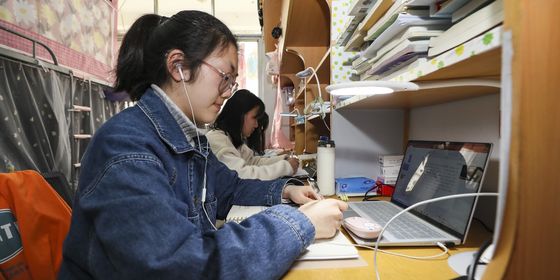Local governments’ Covid prevention measures criticized, lonely students make cardboard pets, luxury earrings put official in hot water, teacher dies after online trolls disrupt classes—it’s Viral Week
Chinese officials reaffirm “zero-Covid” strategy, warns against excessive lockdown measures
At a press conference on Friday, Chinese health officials reaffirmed the country’s commitment to the “dynamic zero-Covid” strategy, but vowed to crack down on excessive restrictions imposed by local governments.
This announcement comes in the wake of several tragedies that sparked public outcry against one-size-fits-all policies that several cities’ governments initiated to contain local outbreaks. This includes a woman in Hohhot, Inner Mongolia, who committed suicide because her community management would not unlock her building’s gate in order for her family to get her medical assistance; and a 3-year-old boy who died from carbon monoxide poisoning in Lanzhou, Gansu province, due to delays in sending an ambulance to his home in a “high-risk area.” Both cities have vowed to revise their lockdown measures to avoid similar tragedies in the future.
A man in Baoding, Hebei province, who wielded a knife in an attempt to exit his community to buy milk powder for his baby, also drew public sympathy to the plight of ordinary people under excessive lockdown strategies. Out of sympathy to his situation, the police fined the man just 100 yuan and delivered two cans of milk powder to his home.
Lonely Chinese students adopt dogs...made of cardboard
A new fad is sweeping Chinese university campuses: “cardboard dogs,” toy animals handcrafted from discarded cardboard boxes, which students tie up in front of their dormitory to “guard” the door, and even take for walks. Students have told journalists that cardboard dogs help them avoid boredom and provide “spiritual comfort” on campus, where many students have been confined due to pandemic controls.
Official investigated after luxury earrings spotted during press conference
Authorities opened an investigation into an official in Hohhot, Inner Mongolia, after netizens noticed she was wearing what appeared to be luxury branded earrings and scarf during a press conference on the city’s pandemic prevention measures. Li Shaoli, deputy director of the local Administrative Approval and Public Service Bureau, wore earrings that looked similar to a set by jewelry brand Van Cleef & Arpel which retail for around 30,000 yuan, more than three times the typical monthly salary for officials at her rank; while her scarf is believed to be made by Hermès, retailing at nearly 4,000 yuan.
“Murder game” centers offer roleplay experiences for kids
Chinese netizens are buzzing about “jubensha for kids” centers, many of which are former after-school tutoring institutes which have turned to offering crime-solving roleplay games to minors following last year’s ban on tutoring. With the government prohibiting tutoring on academic subjects on weekends and holidays for primary and middle school students, many tutoring centers have apparently turned to offering youth theater and roleplay experiences to stay in business, with parents sending their children in hopes that they have fun while learning about history, literature, and problem-solving skills.
Tourism official goes viral for self-directed promotional film
Xie Wei, chief of the Suizhou Municipal Bureau of Culture and Tourism in Hubei province, received criticism online for a crude film he directed and starred in to promote a local tourism spot. Netizens deemed Xie’s performance an ancient knight at a local spot famous for ginkgo trees to be “ugly.” Xu later explained in an interview with China Newsweek that the “roughness” of the video was because the bureau didn’t have the funds to pay professionals or celebrity influencers to make them. Xie has uploaded 23 videos promoting local culture to his Douyin account, in which he has played various characters, from a scholar, a cook, and even Tang Seng, the monk in the classic novel Journey to the West. Despite netizens’ recent criticism, his account has attracted 52,000 followers.
Student’s king crab dish sparks controversy
A video of a child named “Little Su” cooking a king crab worth 998 yuan during his primary school’s cooking competition in Xi’an, Shaanxi province, received over 5 million views in one day, with many accusing the boy’s family of “flaunting their wealth.” In response, Su’s father told The Paper that his son enjoys eating and cooking seafood, that they took the competition seriously, and hoped to help his son win with something “novel and eye-catching.”
Teacher’s sudden death throws spotlight on online class disruptors
Liu Hanbo, a 46-year-old high school history teacher from Xinzheng, Henan province, died suddenly after giving an online class last week, possibly of a heart attack. Since early October, Liu had been targeted by online trolls who joined her classes and disrupted her lessons, often insulting her, playing loud music, or sharing their screens. Local police had been investigating Liu’s case before she died. Trolls logging into other people’s classes is common, and there are even WeChat groups for sharing meeting IDs that enable the disruption. Netizens called for better protection and counter-measures against online bullies, while internet giant Tencent has promised better security measures and penalties for violators.
Debate over supply and marketing cooperatives
China’s supply and marketing cooperatives, a government-run system of goods distribution established in the 1950s as part of the planned economy, attracted attention last week with netizens debating whether the concept is appropriate for the country’s modern economy. In reality, the system has persisted for decades and achieved revenue of over 6.26 trillion yuan in 2021.












